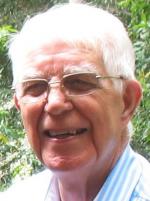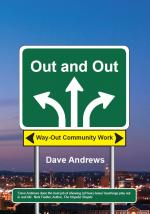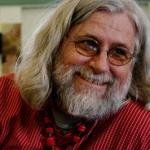
Brian Lightowler, author of Corruption: Who Cares? and Abseiling into the unknown writes about a new book by Dave Andrews on how communities can change the world.
Dave Andrews and his wife Ange have a revolutionary and refreshing approach to life and his new book, Out and Out, reflects that. When I first met Dave he said in the course of conversation that as a young man he had read the story in the Bible of the rich young ruler who asked Jesus what he should do and Jesus replied, ‘Sell all you have and give the proceeds to the poor and then come and follow me.’ Dave said that he had not learnt then the theology of how to re-interpret the Bible and took the passage literally and personally. So he and his wife sold their house and went for fifteen years to Afghanistan, Pakistan and India to serve in poor communities in often challenging environments.
 In today’s world millions of people are attracted to mass movements to change society and the world, some through political or public pressure, some by persuasion and strong advocacy and some by violence. In Out and Out, Andrews points to a better and more effective way, backed up by convincing evidence, both on a personal and international political level. Central to this, the author writes, is the building of community. He draws on his experience as a convinced Christian but not in a way that excludes or is irrelevant to people of other faiths or no faith. He gives a step by step account, vivid and down to earth, of how he and his wife set about building a community in Brisbane’s West End on their return from Asia.
In today’s world millions of people are attracted to mass movements to change society and the world, some through political or public pressure, some by persuasion and strong advocacy and some by violence. In Out and Out, Andrews points to a better and more effective way, backed up by convincing evidence, both on a personal and international political level. Central to this, the author writes, is the building of community. He draws on his experience as a convinced Christian but not in a way that excludes or is irrelevant to people of other faiths or no faith. He gives a step by step account, vivid and down to earth, of how he and his wife set about building a community in Brisbane’s West End on their return from Asia.
He writes, ‘Most attempts to bring about change in society haven’t come unstuck because the groups involved lacked the funds or the numbers. Most came unstuck because of power struggles that caused the groups to self-destruct. The people involved lacked the power to change themselves, let alone their society. Hence, Christ taught that the most important single issue in bringing about a change, was for groups to discover the power to be able to manage their affairs in a way that gave everyone a fair go.’
 One of the many examples he gives from West End, a diverse, multi-racial community close to Brisbane’s CBD, is the story of a group of squatters, threatened with eviction and the destruction of their squat by bulldozer. Andrews and his group visited the squatters regularly and, while learning a lot about ‘the art of survival in an urban slum’, discussed with them what the long term future could be. When the arrival of the bulldozer was imminent there was much talk about what to do, for instance throw bricks through the windows of the police station. Eventually the squatters decided this would be counter-productive and surprisingly agreed among themselves to invite the police around for a cup of tea. As a result a truce was called and the squatters agreed to stop causing trouble and the police not to beat up the squatters. Still the long term problem and need was not solved.
One of the many examples he gives from West End, a diverse, multi-racial community close to Brisbane’s CBD, is the story of a group of squatters, threatened with eviction and the destruction of their squat by bulldozer. Andrews and his group visited the squatters regularly and, while learning a lot about ‘the art of survival in an urban slum’, discussed with them what the long term future could be. When the arrival of the bulldozer was imminent there was much talk about what to do, for instance throw bricks through the windows of the police station. Eventually the squatters decided this would be counter-productive and surprisingly agreed among themselves to invite the police around for a cup of tea. As a result a truce was called and the squatters agreed to stop causing trouble and the police not to beat up the squatters. Still the long term problem and need was not solved.
A year later the council decided to clean up West End and ordered the squatters to leave the block of land. If they refused the bulldozers would probably come. They urgently discussed the situation. In the heat and frustration of the moment someone asked, ‘What would Christ do?’ Not that they would have seen themselves as a Christian group by any means. The New Testament doesn’t deal of course with squatting under threat of bulldozers, but someone nevertheless suggested the parable about the old widow who out of desperation repeatedly knocked on the door of a judge to gain justice. The squatters decided that they would knock on the door of the city council to seek a just solution to their situation. They drew up a petition to the council and gained the public’s support. Eventually the council gave them land and houses for them to live in and paid the costs of their move!
The impact of all this was not limited to the squatters. The move also opened up new doors and improvements in the wider community. Andrews comments: ‘At the centre of all this activity was a group in the community who remembered that the personal growth and social change had come about because they had followed the agenda of God, personified in Christ.’
Andrews explores many of the world’s initiatives in community building. On the international level he writes in detail on the role of Frank Buchman and others in Moral Re-Armament (now Initiatives of Change) in the reconciliation of France and Germany in the aftermath of the Second World War. He quotes from his friend Jeff Fountain, director of the Schuman Centre for European Studies, whose detailed research shows how Western Europe was refashioned in the immediate postwar years and the role MRA played in that. Fountain comments that Robert Schuman, French Foreign Minister at the time, wrote in the introduction to Remaking the World, Buchman’s collected speeches, that statesmen had only been moderately successful in ‘remaking the world’ and went on, ‘What Moral Re-Armament brought, however, was a philosophy of life applied in action.’
Andrews also writes about IofC's collaboration with Nigerian peacemakers Imam Ashafa and Pastor Wuye. These two men previously had violently fought against each other, became reconciled and helped reconcile their communities. Now IofC works with them to share their experience in trouble spots around the world. Andrews comments that ‘some of the best answers to questions about how we can create peace in the midst of war are being forged in Africa.’
The Twelve Steps Movement, he writes, is a direct offshoot of Buchman’s work in the prewar years in the United States. Alcoholics Anonymous now has 87,000 groups around the world and its approach is now being applied in many other areas of human need, such as in Gamblers Anonymous.
Whether building community or remaking the world grabs you or not Out and Out is a book to read. It is radical and challenging because it is not somebody’s theory, theology or academic reflection, but is a story and an expression of convictions based on experience, sometimes of hard knocks and setbacks, but also of great advancement and joy for both people and nations.
Out and Out; Mosaic Press, Canada;
ISBN 9781743241356; RRP A$26.95
Available in Australia from Booktopia online and bookshops
Brian Lightowler lives in Brisbane, Australia. He is the author of Corruption: Who Cares? and Abseiling into the unknown.
NOTE: Individuals of many cultures, nationalities, religions, and beliefs are actively involved with Initiatives of Change. These commentaries represent the views of the writer and not necessarily those of Initiatives of Change as a whole.

